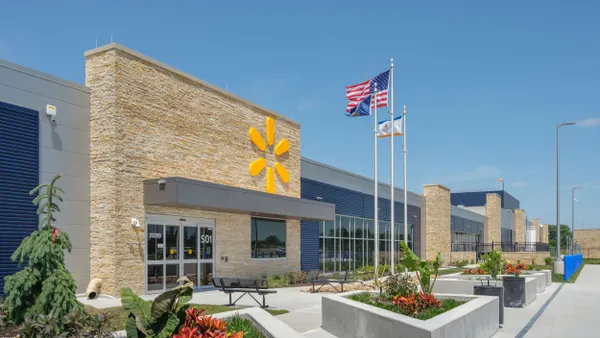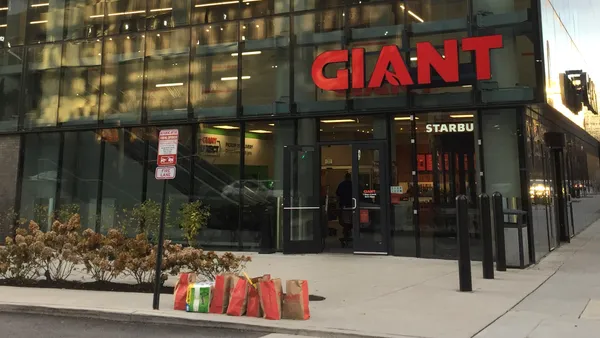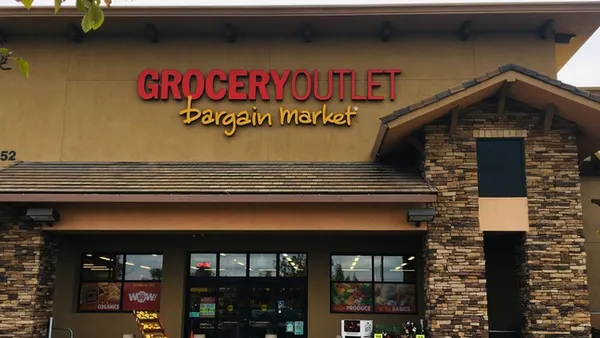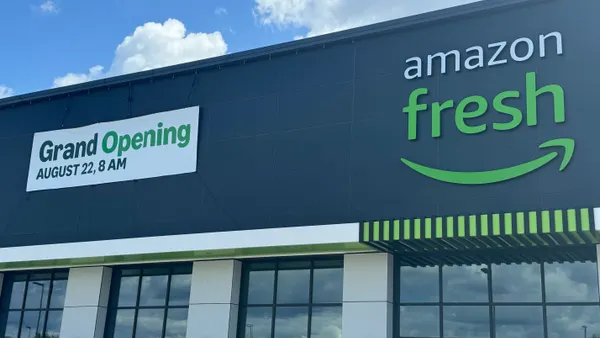Three years ago, Kristen Preau Moore decided to change the name of her business.
She renamed her packaged Jambalaya rice mix company from "Cook Me Somethin’ Mister” to "Jambalaya Girl" — a name that people had started calling her and one that helped her embrace her business as woman owned.
"As far as being a female and a business owner, to me it is just about being true to yourself," she told Food Dive. "For me, it wasn't just being a business owner, it was being the business."
Her mix is now sold online nationwide and in 460 grocery stores, including Costco, Sam's Club, H-E-B, Rouses and Winn-Dixie. While she was changing the name of her business, she decided to formally apply for a special certification.
On each bright yellow package is a cartoon drawing of Moore as Jambalaya Girl, sporting fork earrings with a green apron. On the bottom of the box is a label that reads "Women Owned."
The label — managed by WEConnect International and Women's Business Enterprise National Council (WBENC) — can be found on more than 80 products in the U.S. and even more around the world. It lets consumers know when they are supporting women-owned businesses. Stores, labels and websites that tout the logo were verified by the groups to be at least 51% owned, controlled and operated by women.
"We support female entrepreneurs and those who do business with them by raising awareness for why, where and how to buy Women Owned," the website says.
"As far as being a female and a business owner, to me it is just about being true to yourself."

Kristen Preau Moore
Owner,Jambalaya Girl
Elizabeth Vazquez, president of WEConnect International, told Food Dive the label launched in 2015 and has since expanded significantly. More than 110 countries have women-owned businesses that are interested in certification and by the end of last year, the group planned to certify businesses in 45 countries, she said.
"It was a great way for businesses in the U.S. and businesses outside of the U.S. to be able to use a common logo that everyone could understand and find. We've since translated it into other languages so that the symbol stays the same, but the description of women owned is localized," Vazquez said.
For years, food companies and other industries have faced a lack of female leadership. Vazquez said this label is a very new concept. It is an opportunity for these businesses to be a part of a movement and embrace the fact that they are run by women.
"We're trying to make the invisible visible, to make it easier to get more money into the hands of women. On the outside of the U.S., there are over 550 (women owned businesses) that are able to use that logo," she said. "They're really great role models for other women in the world who maybe hadn't thought of starting a business or growing a business — or if they did, to be proud of the fact that it's owned by women."
"They're really great role models for other women in the world who maybe hadn't thought of starting a business or growing a business — or if they did, to be proud of the fact that it's owned by women."

Elizabeth Vazquez
President, WEConnect International
Bonnie Boroian, founder and CEO of Blissfully Better, a chocolate made with low glycemic coconut nectar, became certified in the spring of last year and has the women-owned logo on all her chocolate bars.
“I think it is important,” Boroian told Food Dive. “There is a heart and passion, for different reasons sometimes, of a woman-owned business.”
The certification also connects business owners with networking opportunities and other resources. Certified businesses have access to supplier diversity and procurement executives at hundreds of corporations that can help the businesses expand their reach and pitch products to retailers. The certification also gives the owners and access to mentoring and education through WBENC and WEConnect.
But the process of getting certified can be extensive. Businesses told Food Dive it can take months to fill out the forms and submit the necessary documentation to prove they are female owned. To be certified, female leaders need to fill out formal documentation about the company's financials and ownership, then there is a site visit for verification.
Katherine Frankstone, the owner of Grey Ghost Bakery, can attest to that. She was rejected the first time she applied in 2017 because she was missing a clause in an operating agreement that would ensure that she had majority control in all circumstances. She reapplied in 2018 and earned the status.
Frankstone told Food Dive the wait has paid off. She attended a conference run by Google last year for digital excellence with only diverse companies, an educational endeavor that she said she wouldn't have had otherwise. She said she has been able to connect with other female business owners, and the label has truly made a difference.
"It has already opened significant doors to customers who perhaps would not have paid quite as much attention to us as they would when they see that we are women owned."

Katherine Frankstone
Owner, Grey Ghost Bakery
"It has already opened significant doors to customers who perhaps would not have paid quite as much attention to us as they would when they see that we are women owned," she said.
Frankstone told Food Dive that she always wanted to own a business, but didn't have the right opportunity until her children went off to college — a storyline for many women.
"One of the things I wanted to do was create jobs and create opportunity, particularly for women," she said. "We are employing women who are taking care of their families and taking care of themselves, so it is nice to be able to do that."












